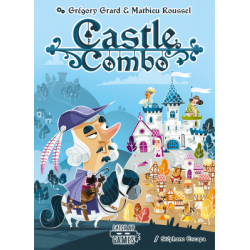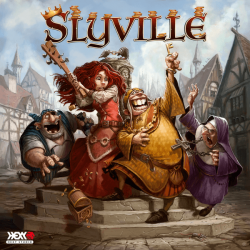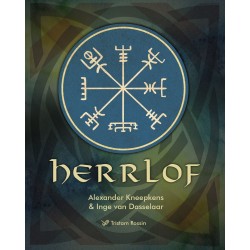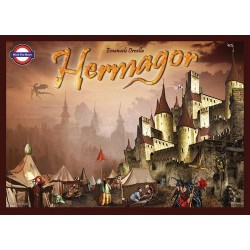No products in the cart.
Active filters
Castle Combo
A quick and nifty card game by the publisher of Faraway.
Each player will spend coins to draft 9 cards from 2 open markets on the table (the lower and upper city), creating along the game a 3x3 square of people interacting with each other to trigger instant effects and end-of-game bonuses.
Slyville
Medieval cities were home to very different types of people. Not only pious monks, humble scholars and trustworthy merchants, but also those mischievous, cunning and dishonest. In Slyville, a board game of bluff and deceit, you become one of the latter kind. As head of a guild operating in one of the world\'s major trade and cultural centers of the Middle Ages, you will be sending your trusted right-hand men to various districts of the city to find trade bargains, make deals, and provide the organization with more power and wealth — not always in a way that is completely legal, but for sure fun and entertaining!
Herrlof
Scandinavia during the viking age, from roughly 800 until 1050 AD, is characterized by powerful magnates (or chieftains) and kings. The title of king is not inherited, you fight for it. The leading magnate is recognised by the others as \'first among equals\'. Four magnates now battle for Herrlof: the victory and praise gained in war. Who will become the next Viking king?
Herrlof
Scandinavia during the viking age, from roughly 800 until 1050 AD, is characterized by powerful magnates (or chieftains) and kings. The title of king is not inherited, you fight for it. The leading magnate is recognised by the others as \'first among equals\'. Four magnates now battle for Herrlof: the victory and praise gained in war. Who will become the next Viking king?
Fiji
In Fiji players make offerings of colored beads over a series of four rounds. To win a round players aim to have the most or fewest beads of each color. A set of condition and effect cards is laid out for each round which determines who will win extra beads.
Hermagor
Hermagor
In a distant land, many years ago there rose a great and wealthy city. Its name, now forgotten by most, was Hermagor. Commerce was the source of its richness, because from all its territory men, artisans, and adventurers brought to the city all kinds of merchandise to sell there: weapons, ancient books, precious relics, and the rare dragon eggs.












